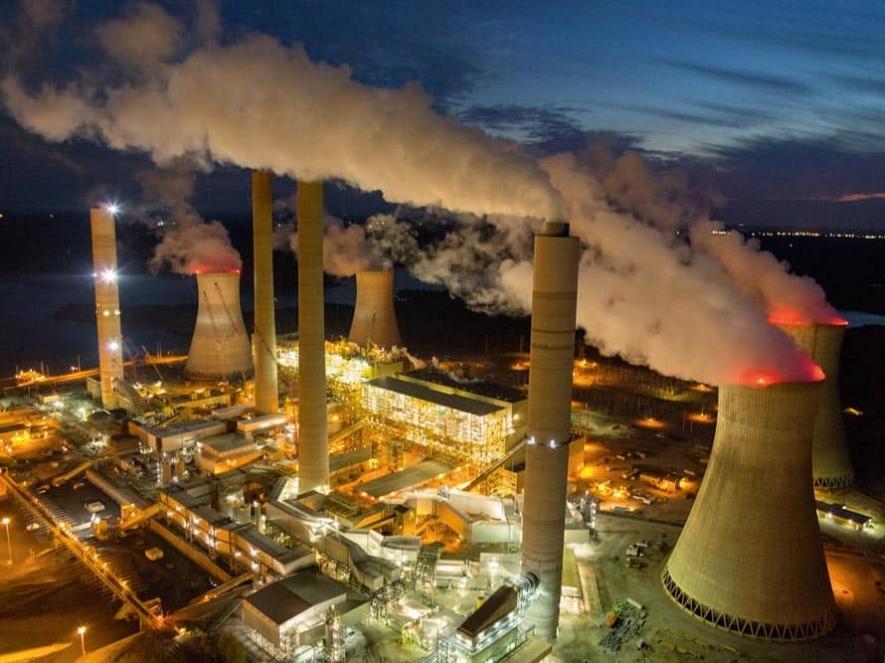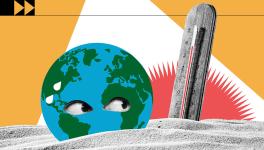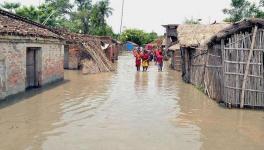India and Global Warming – Uphill Task at the COP 23 Negotiations

Credits: National Geographic
As the French saying goes, the more things change, the more they stay the same. Whether this is true or not in general, it certainly applies to the challenges that India faces in the climate negotiations, currently underway at Bonn. It is clear that the broad trend in the negotiations is in the direction of sharply increasing the burden of climate action in developing countries, while there is a deafening silence from the ranks of the developed nations on the implications of the US's withdrawal from the Paris Agreement. Notwithstanding the tall claims that the Paris Agreement was to herald a new era of climate action and co-operation, it seems that the old strategies and tactics of the developed world continue to be very much in play. But to make matters worse, it is also becoming clear that the unity of the ranks of the developing countries has been radically broken, a trend that was already in evidence at COP 21 in Paris in 2015.
The very commencement of the 23rd session of the annual Conference of Parties (COP23) of the United Nations Framework Convention on Climate Change (UNFCCC), began with a shock for the broad coalition of Third World Nations referred to as G-77 plus China. The Fijian presidency of COP23 (Fiji being the host nation this year has the presidency, though the conference is being conducted in Germany) refused to put on the agenda, a critical item referring to the commitments and actions of the developed countries prior to the commencement of climate action under the Paris Agreement in 2020. Referred to in climate change jargon as pre-2020 commitments, a discussion on this issue is mandated under the Paris Agreement itself and under the terms of the discussions held during COP22 at Marrakech in Morocco last year. The Fijian presidency, in the person of the Fijian Prime Minister, Frank Bainamimara, claimed that there was no consensus on the inclusion of this agenda item among the countries present, but refused to name the countries involved or call on them to present their case for non-inclusion. India, followed by China, and countries like Iran, powerfully protested, but the agenda item was disallowed. It was instead resolved to conduct “consultations” on whether it could be eventually included but this would become clear only on Saturday, 11th November.
What is at stake here in this seemingly procedural dispute?
i) The pre-2020 commitments refer to commitments under the Kyoto Protocol and in the run-up to the Paris Agreement it was agreed that developed nations were called upon (whether they were within the Kyoto Protocol or not) to strive to increase their efforts at climate action especially in terms of mitigation efforts and all-around support to the developing countries, including finance. Refusing to even bring this to the discussion is clearly a stalling tactic, to postpone any move towards further action (as had been promised) since 2020 is only a short three years away. It also shows clearly that the Paris Agreement is in serious danger of not being implemented in good faith by the developed countries.
ii) But underlying this is the deeper story of the developed nations always trying to break down the principle of common but differentiated responsibilities (CBDR). This was firmly written into the Kyoto Protocol and was strongly insisted in other COP decisions over the years. In the Paris Agreement, various hooks have been provided to attempt to weaken this, even though the principle itself has been reiterated. So clearly the first order of business is to try and sideline in the negotiations anything that strongly refers to CBDR. This obviously has serious implications for how matters will proceed in the future.
iii) It is clear that the Third World countries are not united and the Fijian action only demonstrates the increasingly aggressive behaviour of some of these countries in teaming up with the big, developed nations. The trend had already begun after Copenhagen at Cancun, and in Paris, a new coalition of several Third World countries and the developed nations including the US, ironically named the “Coalition of the Willing”, was made to put pressure on countries like India and China. The basic strategy is to make some of these smaller nations act as proxies for developed countries to mount pressure on the bigger developing nations. While the concerns of these smaller nations, especially the island states, are genuine, nevertheless the strategy of aligning with the world's biggest carbon culprits from the developed world is hardly the answer to the problem. It is clear from the experience of Paris that China, given its sheer weight in the global order can push back such pressure, but it is India and the other nations in the group Like Minded Developing Countries (LMDC) that stand to lose the most (the list includes China, Cuba, Vietnam, Venezuela and Bolivia among others and our neighbours Sri Lanka and Pakistan).
iv) Finally, the big question is whether the very nature of the negotiations is under threat, with earlier agreements and decisions not being honoured, with negotiations being conducted in bad faith and decisions rammed through, leaving countries that have been short-changed to contemplate either dramatic counter-action or simply accept it as a fait accompli.
The shock at the opening plenary has not been the only contentious issue in the negotiations. Another potential disruptive tactic in the making is the so-called Facilitative Dialogue to be conducted among all the parties in 2018 to identify means of strengthening (to “take stock of the collective efforts” are the words used in the official documents) the progress towards the long-term mitigation goals of the Paris Agreement and examine the pledges made by individual countries (known as Nationally Determined Contributions or NDCs) in this context. But in setting up this dialogue the Fijian presidency, with the collaboration of Morocco (president at cop22) are contemplating a procedure that in many ways carries the danger of bypassing the negotiation process. The dialogue procedure as envisaged, named the Talanoa (a Fijian word referring to a traditional dialogue form among traditional communities) dialogue, is claimed to be “inclusive, transparent and participatory.”
However the ambit of the dialogue is very expansive, aiming to cover the questions of “where we are, where do we want to go and how do we get there.” But the open-ended nature of such questions, given that the process of submitting NDCs has been gone through just two years ago and work on all other aspects of the Paris Agreement is still underway, should raise suspicions regarding the direction such a dialogue process will take. A very loosely structured process built around so-called roundtables with all actors (including state and non-state stakeholders) free to hold supporting events at all levels (national, regional or global), it carries the key danger that the summary or conclusions of the dialogue would be put together by a small group centred around the Fijian Presidency and the Polish presidency of COP 24 which takes place in December 2018. Indeed the procedure envisages precisely this with the danger that unwelcome points of view can be conveniently excluded in this loosely structured process.
An amazing feature of this dialogue is that of the two key global events envisaged for this process, apart from the Heads of State meeting in Paris in December 2017, the other is the Global Climate Summit 2018, to be hosted in September 2018, in San Franciso by California's governor, Jerry Brown, a Democrat. Convened with the help of co-chairs including Bloomberg (former New York mayor and now the UN Secy Gen's special envoy on climate change), the current Secretary-General of the UNFCCC and Anand Mahindra from India, this self-proclaimed “summit” is to be steered entirely by a committee made up of international NGOs and think tanks. What is the role of such a group that is not accountable to any serious public or, more importantly, political fashion is not at all clear. More seriously, it appears that the political and business elite in the United States, that worked hard to ensure a climate agreement that would meet their interests, is bent on ensuring their hold on the process of implementing the Paris Agreement, despite the fact that they hold no political office. In a remarkable act of hubris, Bloomberg has promised that if the US, due to Donald Trump, does not pay its dues for UNFCCC functioning, he would step in to provide $15 million in finance.
It is obvious that developed countries, and the US, will not be dictated to by the doings and opinions of such self-appointed groups, nor are such groups likely to compromise the interests of the big powers and big capital. What is at stake though, will be the freedom and the requisite flexibility for developing countries to pursue their own path of development within the overall constraint of limiting global warming. Pressure is sure to build on the so-called “emerging economies” to bridge the gap in reducing greenhouse gas emissions that have arisen with the US announcement
There are a number of other issues that are of concern to India and other developing countries. These include climate finance (of which in practice little positive can be said and where the inflow of real finance is still a trickle), technology transfer, a comprehensive approach to the NDCs including adaptation, and the issue of sources of finance to deal with the loss and damage due to global warming. In all of these, there are a number of contentious issues to be dealt with and the initial acts of the Fijian presidency do not bode well for the future. There are also important issues of detail here which need to be discussed but has to be done so on a subsequent occasion.
It is clear that India faces difficult choices in dealing with the current situation. One must be aware that the old game of constantly increasing pressure on India and other large developing economies will only continue. In the meantime, the developed nations will continue to ensnare the small and least developed countries in their machinations, making promises that cannot be kept, such as the promise made in the Paris Agreement to try to limit global temperature increase well below 2 deg C and “pursue efforts to limit the temperature increase to 1.5 degrees Celsius above pre-industrial levels.” This is a promise that the developed nations cannot keep in the manner that they are progressing today, and with the withdrawal of the US it is even more unlikely.
Developing nations undoubtedly have their due responsibilities to their own peoples and the peoples of the world. But achieving the goal of combating climate change cannot be achieved with a large part of the world's population permanently stuck in a low-energy, low-productivity, low-well being a trap. For India, there is undoubtedly need for a continuing domestic debate, free and transparent, on the choices before us. However, at the global negotiations, India still needs to defend its right to the flexibility to determine its future and not be dictated to by an alliance of the developed nations and developing nations too weak to resist their blandishments. If it appears to the reader that all this has been said before, she is indeed correct and the Paris Agreement has as yet made little difference to the nature of this overall challenge.
T. Jayaraman is Professor, School of Habitat Studies, Tata Institute of Social Sciences (TISS), Mumbai. Views expressed here are personal.
Get the latest reports & analysis with people's perspective on Protests, movements & deep analytical videos, discussions of the current affairs in your Telegram app. Subscribe to NewsClick's Telegram channel & get Real-Time updates on stories, as they get published on our website.























